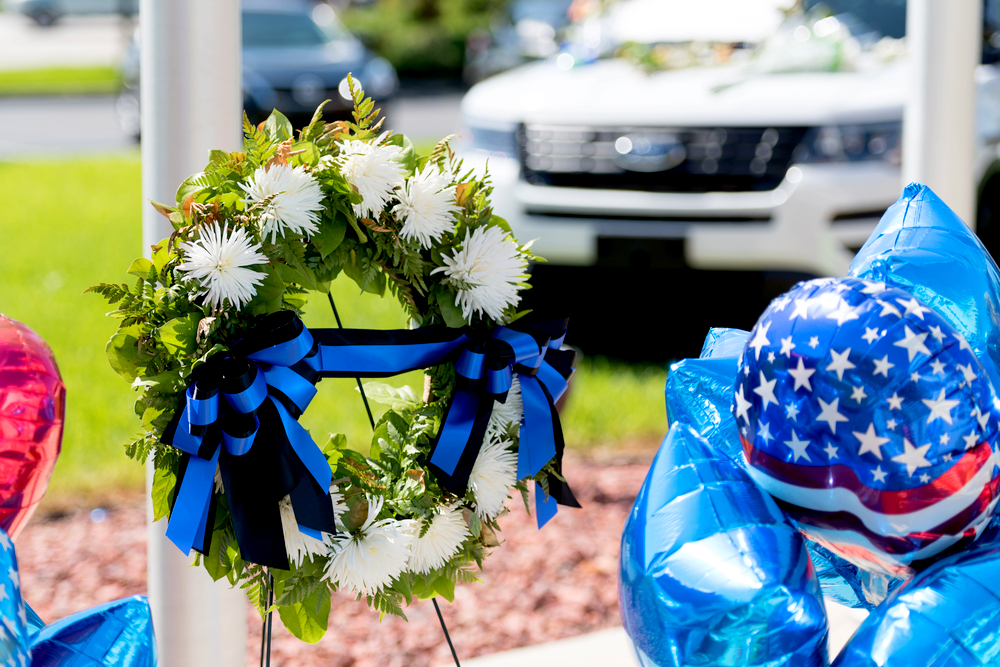Sarasota County, Florida sheriff’s office Captain Ryan Brown composed and dispatched an email to roughly 400 deputies, forewarning them that the iconic “thin blue line” symbol would henceforth be prohibited. All deputies were directed to refrain from displaying the pro-police symbolism in a capacity while on duty. Why? Great question!
Captain Brown seemed to telegraph that prohibiting his law enforcement deputies from displaying the thin blue line icon is about uniformity. According to a passage published by USA Today, Brown’s directive is more about aesthetics and agency appearance: “We need to make sure our agency personnel— make sure their uniforms are consistent with what they are issued by our quartermaster,” he said. “The thought is, it’s not about the ‘thin blue line,’ it’s about making sure their uniforms are consistent and agency-issued.” That seems to be rather sophomoric expressionism, as if hard-earned slots as law enforcers modeled after military uniform specs needs basic guidance such as what was outlined in his statement.
Moreover, the thin blue line emblem is not novel—not new in any stretch of the imagination. So why now? Why all of a sudden must the thin blue line symbol be judged as not suitable when suiting up for duty? Has this something to do with Black Lives Matter and “defund the police” movements and similar misguided zealots trumpeting the scale-down and abolition of police forces, despite myriad good deeds done on the daily?
Going out on a limb, this maneuver to suppress a blue stripe flanked by two black stripes denoting the separation of good v. evil stems from the hypersensitive overreach we are seeing since the tragic murder of George Floyd. What is next, take away police whistles? No eagles on badges? Blue emergency lights hurting feelings?
Seems that limb has muscle. “The thin blue line has now been associated, by some, with a stigma of protecting each other from getting into trouble, from creating an us vs. them philosophy, etc.,” Captain Brown offered in the email.
Oppressing one segment of American society over another is the inherent purpose for police in the first place—to see to it that equality has proper reach and application. It is a cop’s mission to ensure equal rights, to deny deprivation of constitutional allowances as American citizens—of which cops belong.
Abolishing the police will never happen. And “defund the police” movements may have some deleterious effect (which cops have been subjected to for decades) by reducing equipment procurement (rendering the tasks unsafe and therefore life-threatening) and rationing training (like any profession, training optimizes employees’ performance and service delivery). In effect, counterproductive implementations will only serve miscreants salivating over the ludicrous prospect of a police-free America.
Despite the political pressure points, notwithstanding some law enforcement executives and politicians caving to the whims of anti-police folks whose self-fashioned blinders block out myriad phenomenal police work accomplished all across the nation, the law enforcement profession will not be demised. Instead, scrutinizing current protocols for reform, applying modernized methods and mutually respected outcomes between cops and citizens is always a great idea.
Instead, it appears factions are forming in which the goal is to chip away at the law enforcement institution piece by piece, fiber by fiber, including a medium-blue sliver flanked by two black slivers emphasizing the undeniable ongoing battle between those who would do us (citizens) harm and those who bravely offer themselves (police lives) as the impediment taking up the fight for others’ salvation.
Captain Brown added a detail which reminded me of the unfortunate police funerals attended throughout any police career, and how the thin blue line was stratified and worn by all cops respecting the fallen and honoring the profession. “Brown would not say what the logo means to him, but added that ‘it means a lot to a lot of folks in law enforcement, but the message is to be consistent with the uniform and to wear what is issued,'” reported USA Today.

So even at a police funeral, law enforcement deputies in Sarasota County are denied donning the sacred symbol encapsulating the us v. them credo defining the sheer fact that good guys exist to thwart bad guys from harming innocents. It may surprise to learn of Brown’s assertion on this very specific us v. them factor: “It was brought to my attention that possibly somebody had a patch. That’s the bottom line,” Brown said. “They had a patch somewhere on their uniform. I know that symbol is under attack by some, but if it’s not agency issue, why are we wearing it? It’s a matter of sticking to policy.” As mentioned above: Why all of a sudden? Why demonize something which stands for great stewardship such protection and service? With this brand of ideology, should our military members shed camo patterns forever?
MORE NEWS: Michigan Grocery Store Squatter Exposes Law Enforcement’s Snooze Button on Enforcing Crimes
This piece was written by Stephen Owsinski on June 13, 2020. It originally appeared in LifeZette and is used by permission.
Read more at LifeZette:
Whitmer launches vile attack on cops: says ‘I don’t disagree’ MI police would kill capitol protesters if they were black
Baltimore school calls police on child after seeing BB gun in house during virtual class: says he effectively brought a gun to school
Robert De Niro says he is ‘certainly looking forward to’ President Trump being in prison
The opinions expressed by contributors and/or content partners are their own and do not necessarily reflect the views of Steve Gruber.
Join the Discussion
COMMENTS POLICY: We have no tolerance for messages of violence, racism, vulgarity, obscenity or other such discourteous behavior. Thank you for contributing to a respectful and useful online dialogue.